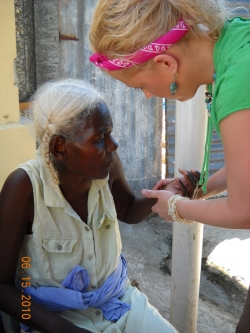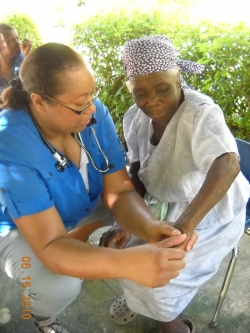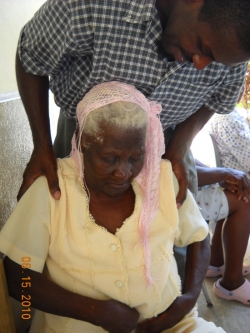 When you work at HelpAge, you lose your “age-blindness” very quickly. I sat at the departure gates at JFK for the flight to Port-au-Prince, and noticed how many travellers were older Haitians. Many were travelling alone or with young children.
When you work at HelpAge, you lose your “age-blindness” very quickly. I sat at the departure gates at JFK for the flight to Port-au-Prince, and noticed how many travellers were older Haitians. Many were travelling alone or with young children.
Six travellers required wheelchair assistance. I wondered how easy it is to get around in post-earthquake Haiti for those with mobility issues.
And then coincidentally, on my first full day in the country I sat in on some training that was tackling this very issue, among many others.
Care for the especially vulnerable
US organisation, Kissito International, have offered to provide the staff at the care homes supported by HelpAge, the basic tools to care for especially vulnerable older people.
When I arrived, Kimberly Green (Senior Vice President of Post Acute Services) from Kissito was already in full swing, presenting to the staff of the care homes what she and her colleagues had found visiting the care homes:
“When we went out, we saw the patients were very clean, very happy. And in bed. When we talked to staff about getting the residents out of bed and the importance of remaining mobile, they replied they hadn’t been trained in these aspects of care.
 Keeping active
Keeping active
“It’s very important as we age to keep our muscles stretched and active. We need them for eating, dressing, grooming… If we can’t help the residents remain mobile, they can’t help themselves. And they decline.
“We think we’re helping them to dress, to eat, and so on. But if they can do it themselves, and we’re doing it for them, we’re contributing to their decline. Our job as caregivers is to help them help themselves.
“We did simple exercises and massages with residents in the homes in Leogane, and the older people there loved them, they got very excited. They loved having their hands and fingers massaged. Their one worry was this was going to be the one and only time they had these exercises.”
It was clear from watching the care home staff there that they certainly intended these exercises to continue. It helped by having a demonstration on each other to show how soothing and relaxing and hand massage was!
Musical chairs
Kimberly went on to say: “If we add some music to these simple exercises it becomes an exercise class. It can be done, and needs to be done. Tightening muscles are very painful. Your patients are in pain when they don’t exercise.”
Kimberly gave an example of a very short exercise programme used in the US called “Happy Feet” – simply getting people out of their chairs, moving, then getting back down again. This should be done several times a day.
Kimberly also provided real practical advise to the care home staff: “Of course the needs in terms of specialist equipment is great, and there’s a shortage, but I was amazed when I noticed that most of the older people in the care homes who were in wheelchairs were in chairs the wrong size for them. This can be a serious problem. I saw one woman whose feet did not touch the ground. This can lead to swelling and blood clots. So here’s the solution – move people around and find which chair suits which person.”
 “If you don’t use it, you lose it”
“If you don’t use it, you lose it”
Kimberly’s colleague, Angie Mattocks (Chief Nursing Officer) talked a lot about the emotional wellbeing of the residents in the case homes: “We realise that many of the older people here have a lot of fear,” she says. “We have to help them to reduce their fear. Good caregiving will help. We need to be encouraging, and persuasive.
“We saw a lot of residents just sitting around” said Angie “it isn’t good for them in terms of mobility but also in terms of brain activity. The elderly brain must be used”.
Angie had the best catchphrase of the day “If you don’t use It, you lose It”.
Again, the care home staff wanted to know what they could do and what kind of activities to offer.
Angie answered with a simple question: “What did they used to do? What was their job when they were younger? Did they cook? Did they make furniture? Find activities that simply interest them.”
She summed up by saying: “You know, our residents are like us, they didn’t choose this for themselves.”
Read more about HelpAge’s work in Haiti.
